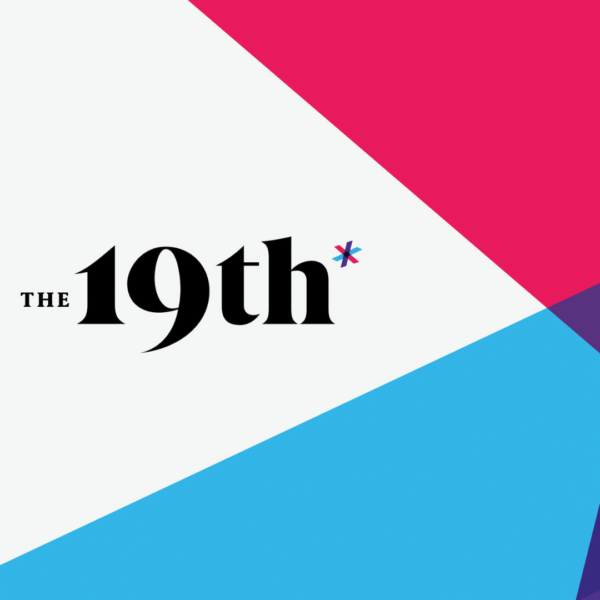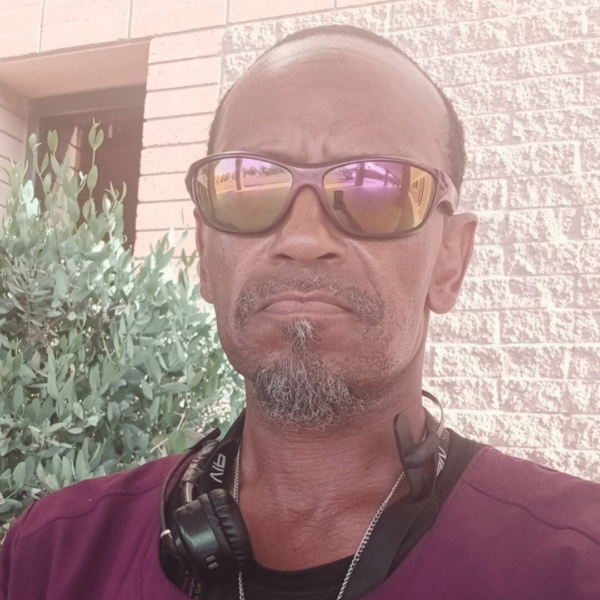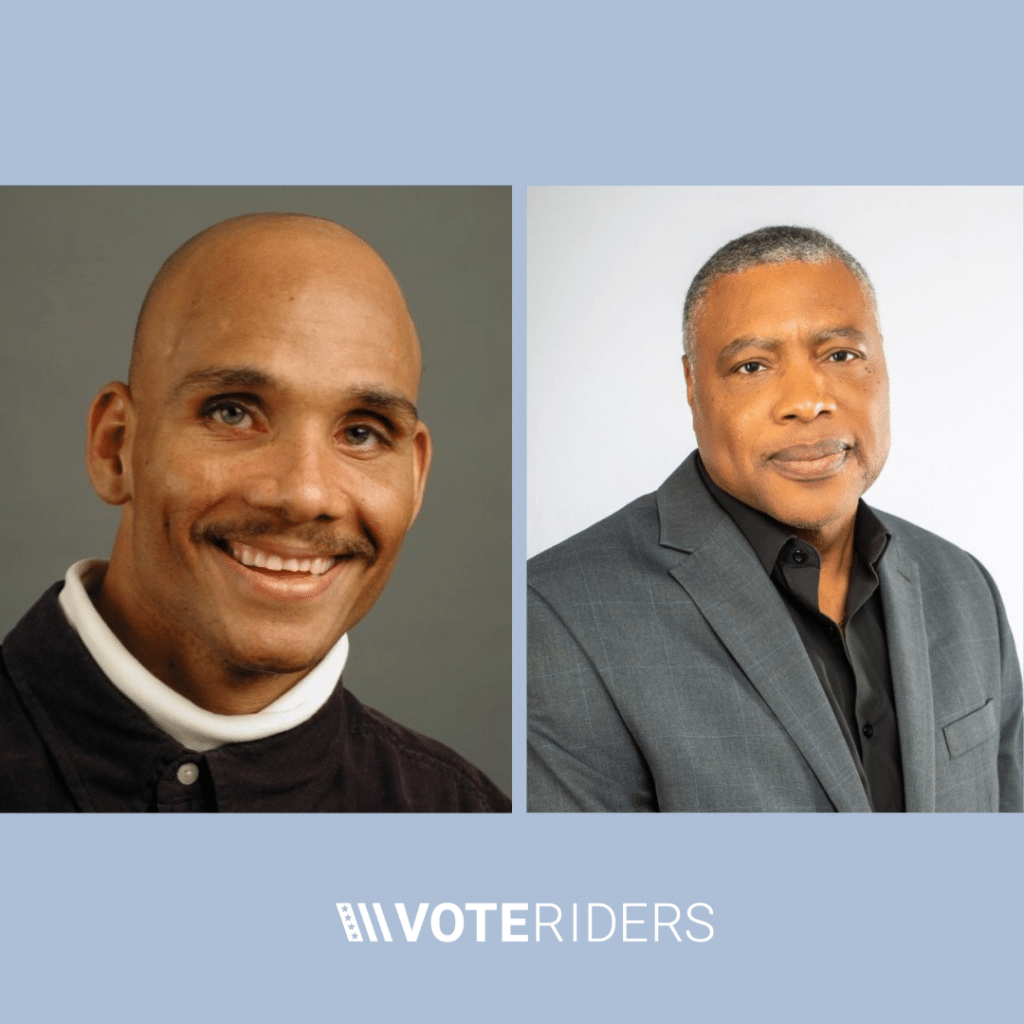
Voting Rights Are Disability Rights: Q&A With Arizona Disability Rights Partners
During Disability Voting Rights Week, Renaldo Fowler, Senior Staff Advocate at Disability Rights Arizona, and David Carey, Disability Justice Educator at Arizona Statewide Independent Living Council (AZSILC), speak with VoteRiders’ Digital Communications Coordinator about their collective efforts to empower Arizona’s disability community through advocacy and voter participation. — SEPTEMBER 12, 2024
Tell me about yourself and your role at Disability Rights Arizona/Arizona Statewide Independent Living Council (AZSILC)
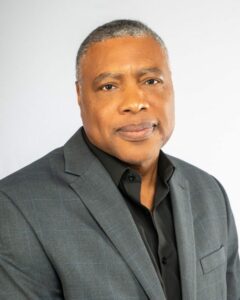
Renaldo Fowler [RF]: I’m a Senior Staff Advocate at Disability Rights Arizona. Our main focus at Disability Rights Arizona is to protect the rights of persons with disabilities. We serve the entire state of Arizona and there are similar organizations to ours in every state and territory in the US. We have many different programs including voting rights, special education, health care, and abuse and neglect.
I’ve been advocating with Disability Rights Arizona for four decades. In 2013 I started overseeing our Protection and Advocacy for Voting and Access (PAVA) project — a voter protection public grant. I oversee five different areas within Arizona to monitor full access to the electoral process. This includes voter registration, voter participation, voter education, collaboration with election officials, and finally, voting rights.
At Disability Rights Arizona, we don’t just talk about voting — we talk about full access to the electoral process. Elections happen every couple of years, but what happens in between those elections? There’s a lot of planning that goes on. When people with disabilities are involved in the planning process with election officials, that’s what we call voter participation.
In terms of voter education — as a voter with a disability, do you understand what your rights are? As a voter with a disability, do you know how to request accommodations? We focus on things like that, and a lot of that work is done within the self-advocacy community — we have different advocacy curricula depending on the population. During the pandemic, for example, we worked a lot with young people with disabilities because the next generation must be proactive about changing the culture of voting.
As for voting rights, our focus as a law firm is educating voters with disabilities about their rights and making sure they know what their options for voting are in Arizona. For example, what your voter registration options are, what your options around guardianship are, what your state voter ID laws are — with help from VoteRiders — what are some of the barriers that may make it difficult for you to vote and how can you overcome these obstacles?
David Carey [DC]: I’m the Disability Justice Educator at Arizona Statewide Independent Living Council (AZSILC).
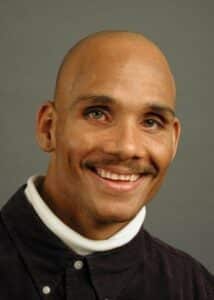
I’ve been here about four years but I’ve spent the past 20 years advocating for programs and services that improve the quality of life for people with disabilities.
AZSILC promotes opportunities and experiences that advocate for people with disabilities from across the state of Arizona. I joined AZSILC to work on a COVID grant focused on disability outreach and determining how COVID-19 affected the disability community in Arizona
Now I do a wide range of things at AZSILC — I’m like a “jack-o-lantern of trades”, a master of none. I support the State Administrator in establishing best practices for our key initiatives and fostering collaborations with partners — like VoteRiders and Disability Rights Arizona. I work closely with our team and community partners to address barriers faced by people with disabilities — especially those from marginalized communities — and ensure our initiatives reflect the diversity of Arizona.
What are your organization’s missions and what are some of your key initiatives for the rest of 2024?
RF: There are various ways we protect the voting rights of persons with disabilities. For example, on Election Day and during the election cycle, we have a Voting Hotline where we answer phone calls with the goal being to resolve those issues on Election Day. These issues could be, for example, ‘I went to the polls and the voting machines didn’t work for me.’ We also have an Arizona Disability Voter Advocacy Coalition — we’ve been together for 10 years or so. We’re a group of stakeholders and persons with disabilities and we’ve done many projects with our election officials. David is also involved with the coalition. Regarding our work with election officials, we want to make the people who run our elections understand the needs of voters with disabilities.
Sometimes there is one talking head within movements, but at Disability Rights Arizona, our main focus is to make sure we have many voices at the table — that’s crucial for us. Our credibility is strongest when election officials meet with individuals from the blind and low-vision community, people from the deaf and hard of hearing community, self-advocates, and people who represent all the spectrums around disabilities.
When our organization meets with our election officials, I don’t talk about the needs of the blind and low vision community, instead, SAAVI Services for the Blind — a big agency provider for the blind community led by people who are blind and visually impaired — does the talking. The same goes for the deaf and hard of hearing community, these conversations are led by the Arizona Commission for the Deaf and Hard of Hearing.
DF: The mission of the Arizona Statewide Independent Living Council (AZSILC) is to advance the rights, choices, and values of people with disabilities through advocacy, leadership, and collaboration. AZSILC promotes independence, self-determination, and community integration for all Arizonans with disabilities. As a coalition, we sit down and raise issues that are important to us. Right now, the one big focus is on emergency preparedness, which we continue to do every year to make sure people with disabilities are well-equipped to handle emergencies. We also plan to do more advocacy during the rest of 2024.
We’ll continue to work with our partners to advocate for policies that protect and advance the rights of people with disabilities, including efforts to address systemic barriers and promote equity. We also plan to focus on voter education and outreach, ensuring that people who have disabilities are informed about their rights and have the necessary resources to participate fully in the electoral process.
Are there central issues driving voters in your communities to the polls this year?
RF: Voters with disabilities represent a variety of political spectrums, so whatever issues drive them to the polls are the same issues driving everybody else. One of the things we’ve identified in Arizona through working with our election officials is that a lot of people are going to spread a lot of dis- and misinformation to sway peoples’ votes this November. This is a big problem especially because Arizona is a “swing state,” and most of this mis and disinformation will be on social media, which many voters with disabilities rely heavily on for news. So, ahead of this year’s election, we’re focusing on educating the disability community on deep fakes, misinformation, and disinformation, and making sure people don’t use false information to make voting decisions. We’re also providing the community with trusted information and telling people to go to the Secretary of State’s Office, County Recorder’s Office, or Election Director for reliable information. We’ve done several events focused on this and have several more trainings coming up with our election officials.
DC: Ensuring access to quality healthcare — including mental health services and long-term care — is a significant concern. For some, healthcare affordability is a driving issue. Voters are also likely concerned about preserving and strengthening the Americans with Disabilities Act (ADA) and other legislation that protects their rights and opposing any efforts to weaken these protections. Accessible voting and ensuring that voting processes are fully accessible is also a top priority.
Voters with disabilities may be focused on advocating for policies that make voting easier and more inclusive, such as accessible polling places, mail-in voting, and the protection of voting rights.
Issues related to employment — such as increasing job opportunities, ensuring workplace accommodations, and addressing wage disparities — are also important issues driving disabled Americans to vote. Access to affordable, accessible housing and reliable transportation are also ongoing concerns. I also think there are some initiatives on the ballot in Arizona that will drive a lot of people to the polls — the presidency, of course, and reproductive rights and immigration. Although there are many referendums that voters with disabilities on either side of the political spectrum have strong opinions about, AZSILC is a nonpartisan nonprofit, so our goal is to say to voters, ‘If you have strong opinions and want to participate in the political process, here’s what the referendums say and here’s what you can do.’
At VoteRiders, we know that Arizona’s voter ID law makes it hard for many voters, especially voters with disabilities, to cast a ballot. What are some of the ballot box barriers voters in your communities face?
RF: Transportation is a major issue. If you live in certain parts of Arizona you may have to drive 16 miles just to get to a polling location. Another issue is voting under limited guardianship. We had a recent court decision in Arizona saying that people under full guardianship are unable to vote. We also just had a Supreme Court decision in Arizona regarding proof of citizenship — the law keeps changing regarding whether or not you need documentary proof of citizenship to register and vote. So a lot of voters are confused about what ID they need to register to vote and which forms to fill out for state versus federal elections.
When we talk to election officials, we look at voting from a customer service approach. We don’t talk about the ADA much because we don’t talk about minimum standards, we want to talk about what a good voting experience is for voters with disabilities. We know that according to the ADA, there are supposed to be accessible polling locations, but our focus is on which standards are practiced and what voters’ needs are. We want voters to expect that when they go to the polls, they’re going to have a good experience.
We do this by talking with elected officials and emphasizing the importance of various things — like making sure voting centers are near public transportation. We try to identify these polling locations and voting centers, we make sure the voting machines for voters with disabilities are on, and we make sure poll workers are trained on how to use them and have an understanding of disability etiquette.
In terms of vote-by-mail, 80% of people in Arizona vote by mail — there’s a whole generation of people who’ve never been to the polls. However, the ballots that the general population receives in the mail are not in an accessible format for persons with visual impairments. That’s another problem that we’re aware of and we’re trying to work on. Some people think these challenges should be fixed overnight. It’s always been a struggle to vote in this country, but we’re working on it.
DC: Many polling locations are not fully accessible to people with physical disabilities. This can include issues with parking, building entry, or the voting area itself. Some polling places may lack voting machines that accommodate people with visual, hearing, or mobility impairments, making it difficult or even impossible for them to vote independently. For voters with disabilities, getting to and from polling places can also be a significant challenge, especially if they rely on public transportation or paratransit services that may be unreliable or unavailable on Election Day.
Also, let’s say you rely on Dial-a-ride — a door-to-door service — for transportation and you’re on a fixed income. Let’s say that ride is going to cost you $8 — you might have to decide if you want to vote or eat that day.
I always recommend voting by mail because you never know what’s going to happen the day you plan to vote. What if you get sick or something happens and you have to go home after waiting in line for ten hours? So, I’ve always thought voting by mail is the best way to have your ballot securely counted, the best way to know you’ve done your civic duty. But like Renaldo mentioned, while mail-in voting is an option for many, it can pose challenges for voters who have disabilities who may need assistance with reading or marking a ballot, and who may not have a trusted person to help them without compromising their privacy. Arizona’s voter ID requirements are also constantly changing and becoming more restrictive. Strict voter ID laws can disproportionately affect people with disabilities, especially those who may have difficulty obtaining the necessary identification due to mobility issues or lack of access to transportation.
At VoteRiders, we have free state voter ID resources that outline state-specific voting options for Americans with disabilities. How are your organizations addressing voter ID needs and other voting barriers in your communities in partnership with VoteRiders?
RF: As I mentioned earlier, one of our big efforts is to look at access to the electorate process and work proactively with our elected officials so we can minimize voting barriers before the election rather than on Election Day. So for example, we’ve had demos of new election equipment where election officials bring engineers and they come in and test the machines and make recommendations. In general, we trying to give the disability community as much information and resources as possible so they can advocate on their behalf and get the support they need.
We know it’s an ongoing journey. A lot of times people with disabilities come up to me and say, ‘The ADA is 30-something years old and I’m still having issues getting to my polling location’ and I say to them, ‘The ADA is a tool, not a panacea. It’s a tool to continue to challenge.’
Our partnership with VoteRiders is a natural fit. When VoteRiders’ Arizona Coordinator Dani Duarte and VoteRiders’ National Outreach Director, Selene Gomez came on board, we started doing voter ID training together because it’s really important information. The state Developmental Disabilities Advisory Council holds a town hall and a lot of members express issues with getting their voter ID, birth certificates, and other underlying documentation. The work that VoteRiders does around voter ID is so important, especially in a state like Arizona, which has a confusing voter ID law. Through training, VoteRiders provides our staff with voter ID education so we can give this information to our community and let them know that VoteRiders is here if they need free voter ID information or assistance. VoteRiders is a great resource, we invite you to be a part of all of our events and all of my PowerPoints include a link to your website. We build your resources into all of our work as much as we can.
I’m really proud of our collaborative work. At the Arizona Disability Voter Coalition, we have many different voices — that’s our strength. We’re also always in communication with our Special Election Board through our Arizona Disability Voter Coalition. These meetings were designed so the disability community would have direct contact with our election officials — no gatekeepers. We have representatives from the deaf and hard of hearing committee, blind and low vision community, people with disabilities who are self-advocates, and care providers. We know things are not perfect in Arizona, but we’re pushing along.
DC: Our partnership with VoteRiders is an essential part of our efforts to ensure that every person with a disability can participate fully in the electoral process.
We work with VoteRiders to make sure the disability community has clear information about voter ID requirements and how to obtain the correct identification. This includes inviting VoteRiders to lead voter ID trainings and distributing VoteRiders’ state-specific Voter ID Information Cards. We also collaborate with VoteRiders to offer direct assistance to individuals who need help obtaining an acceptable ID. VoteRiders helps by covering the cost of documents, providing transportation to ID-issuing offices, and helping with the application process.
We’re celebrating Disability Voting Rights Week with a couple of voter education trainings, including one with VoteRiders about Arizona’s voter ID law. We’ll also have training on the 13 initiatives that will be on the ballot in Arizona this year. Some of these trainings will also discuss proposed legislation and how to be a more proactive advocate, so if people want to advocate at the Capitol with us, we can provide them with the information they need to fight back. But as you and I know, that’s not always the thing political leaders want — they really don’t want people engaged in the political process so what better way to prevent participation than by making it difficult for you to testify on laws that will affect you and your community’s life.
What would you say/ have you said to someone who told you they feel like their vote doesn’t matter?
RF: It’s simple. I say, ‘If you don’t vote, you can wait and have somebody else choose for you. Do you want to give other people your power?’
DC: I would probably tailor my response to the person depending on their needs. For example, if someone who received long-term care services said that, I would tell them how important it is that they vote for someone who wants to improve the long-term care system instead of destroying it. I also try to know what’s on the ballot so I can educate people on what the stakes are and why they should be voting.
VoteRiders is proud to have worked alongside thousands of organizations to bring voter ID information and assistance to voters across the country. We know millions of Americans need help with voter ID – but most organizations don’t have the resources to answer questions or provide personal assistance. VoteRiders wants to be your partner in filling that gap. Learn more about how we can work together.

